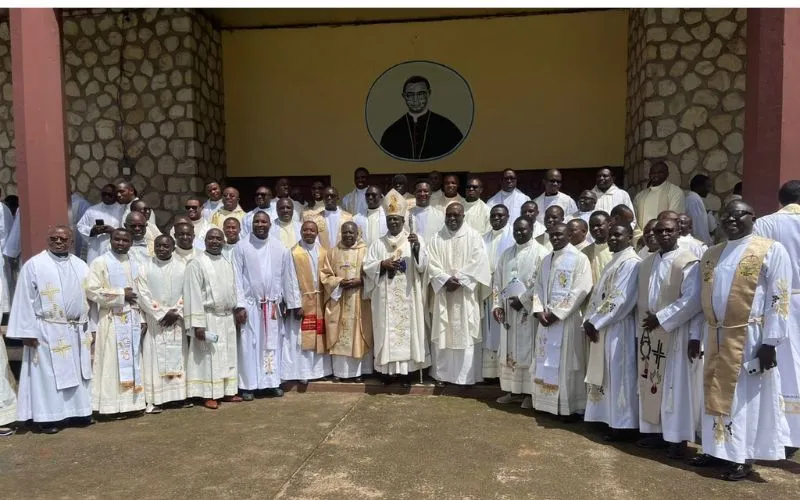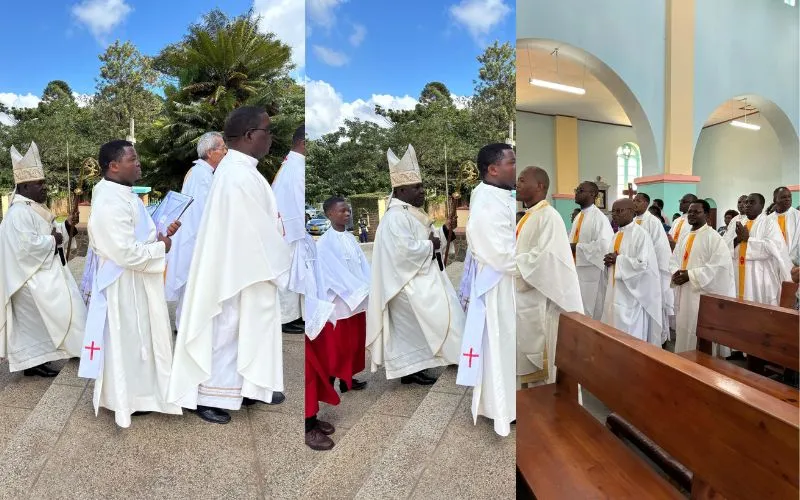Communion in the Eucharistic Celebration
“Hierarchical communion is most meaningfully expressed in the Eucharistic prayers,” Archbishop Nkea said.
He explained, “When the Priest prays for the Pope, the College of Bishops and his own Bishop, he expresses not only a sentiment of devotion but attests to the authenticity of his celebration as well.”
“The Eucharistic celebration manifests the unity of the Priesthood of Christ in the plurality of his ministers as well as the unity of the sacrifice of the people of God,” he added.
Holy Mass, the Cameroonian Catholic Church leader said, “contributes to the consolidation of the ministerial fraternity existing among Priests. Without the Eucharist, the Priesthood has absolutely no meaning.”
(Story continues below)
Communion in the Exercise of Ministry
“Each Priest is to have a deep, humble, and filial bond of obedience and charity with the person of the Holy Father and adhere to his Petrine ministry of magisterium, sanctification and governance with exemplary docility,” he said.
Filial union with a Priest’s “own vision is also an indispensable condition for the efficacy of the Priestly ministry,” the Local Ordinary of Bamenda Archdiocese added.
“Priesthood without communion in ministry has no meaning. In this province of Bamenda we have a provincial pastoral plan that binds us in the exercise of our ministry, and therefore we share commitment in the exercise of ministry through this common pastoral plan,” he said.
Besides being an expression of maturity, Archbishop Nkea said, “This adhesion which entails proceeding in unison with the mind of the Bishop, contributes to the education of that unity in communion which is indispensable for the work of evangelization.”
Communion in the Presbyterate
“By virtue of the Sacrament of Holy Orders, each Priest is united to the other members of the Priesthood by specific bonds of apostolic charity, ministry and fraternity,” Archbishop Nkea said.
Priesthood, he said, is “a true family, in which the ties are not of flesh or of blood but come from the grace of Holy Orders.”
“Belonging to a specific Presbyterate always takes place within the context of a particular church, and not for reasons of incarnation, which in no way alters the fact that the Priest too, as a baptized person, belongs in an immediate manner to the universal church,” he explained.
Archbishop Nkea described the Priesthood as “a moving signpost”, and went on to explain, “The signpost stands on one place and indicates the road to heaven. But the Priest is a moving signpost. You are moving as you show the people the way to heaven.”
“You are also moving towards heaven. You cannot be showing the way to heaven, and you are moving towards hell,” he added.
Archbishop Nkea called upon Priests to “give up everything so as to enter heaven at the end of our lives. It will be a total catastrophe and a waste of life if we direct people to go to heaven and we find ourselves outside heaven.”
Jude Atemanke is a Cameroonian journalist with a passion for Catholic Church communication. He holds a Bachelor’s Degree in Journalism and Mass Communication from the University of Buea in Cameroon. Currently, Jude serves as a journalist for ACI Africa.








